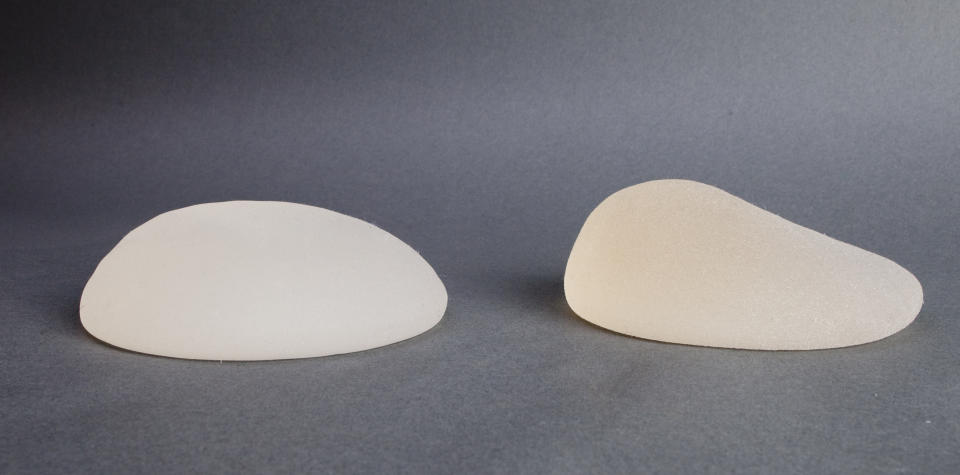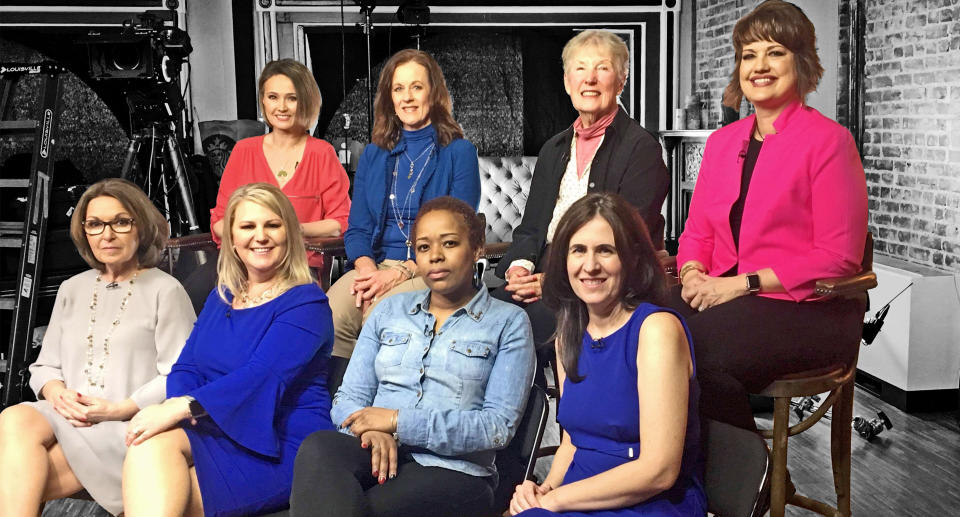Allergan's breast implant recall 'scares the crap' out of women who have them

Allergan issued a worldwide recall of its Biocell textured breast implants this week, and the news has prompted a range of emotional reactions — particularly from women who have or have had the implants, which have been linked to a cancer called breast implant-associated anaplastic large cell lymphoma (BIA-ALCL).
“It just validated that I’m making the right decision,” a Rhode Island mother-of-two, who requested anonymity, tells Yahoo Lifestyle about the surgery she’d already scheduled for late August, to have her textured implants swapped out for another pair.
The announcement of the Allergan recall on Wednesday was prompted by a push from the U.S. Food and Drug Administration — which came only after 38 other countries had banned the Biocell textured breast implant products, due to their link to BIA-ALCL, and after the FDA held a two-day hearing in March to listen to patients, advocates and medical professionals regarding implant risks. While the implants in question account for only five percent of implants in the U.S., and the majority of the 10 million women with implants worldwide have not had major issues, many with the textured implants say they are facing a quandary.
“I’ll have it taken out,” Shelley Shellenberger, a nurse and mother of two in Missoula, MT, tells Yahoo Lifestyle of her single textured implant, the result of post-mastectomy reconstruction. “I didn’t do a lot of research, because I wanted my doctors to guide my care… but it makes me sad that the turn of healthcare is that you can no longer rely on your providers.”

Lia Chester, an artist in Tucson, Ariz., who got her textured implants for cosmetic reasons in 1998, says she too plans to have them removed, particularly after having recent complications that she says have not been taken seriously by doctors. “I’m really, really angry, because the whole time I’ve felt really blown off, trying to find out what was going on,” she says. “To be disregarded so easily, and then find out it’s a worldwide thing, is very frustrating.”
According to the FDA, there have been reports of 573 cases and 33 deaths from the cancer worldwide, with 481 of the cases clearly linked to the Allergan implants. Of the 33 deaths, the type of implant was known in 13 cases, and in 12 of those cases the maker was Allergan, the agency said. Still, the FDA does not advise all women to explant.
“The FDA does not recommend removal for patients without symptoms due to potential risks, but we provide helpful information for patients and providers to consider when discussing next steps,” said Jeff Shuren, M.D., J.D., director of the FDA’s Center for Devices and Radiological Health, in a press release about the recall. “Moving forward, we are committed to continuing to share updates with patients about this issue. We will continually evaluate any new information and may, as a result, take action regarding other breast implants, if warranted.”

Regarding the possibility of other implants’ dangers, the Rhode Island mother — who had a preventative double mastectomy with reconstruction in 2013 after finding out she carried the risk-raising BRCA gene — says she’ll take the chance. “I don’t think I’ll ever feel 100 percent about implants, personally,” she says, noting that she was not aware she even had the textured implants until she heard warnings about them and called her surgeon to ask. “But,” she adds, “I think I really want breasts.”
She is far from alone in the U.S., where about 400,000 women get breast implants annually — 300,000 for cosmetic reasons and 100,000 for post-mastectomy reconstruction related to breast cancer, with only about 25 percent of double mastectomy patients and nearly half of those with single mastectomies opting to remain flat, according to one study.
Deb, a musician in Bloomfield Hills, Mich. (who did not want her last name used), opted for reconstruction with the textured implants after being diagnosed with breast cancer and having a double mastectomy four years ago. “They’ve been bothering me from day one,” she tells Yahoo Lifestyle, adding that, because they’re under her pectoral muscles, she feels a “constant stretch,” and “burning,” making them “constantly uncomfortable.”
She now regrets her decision to have reconstruction rather than simply go flat, but gets emotional when she recounts how overwhelming it was to have to make such major decisions in the midst of dealing with a breast cancer diagnosis. “You’re kind of paralyzed, in a way,” she says. And so, disappointed with the implants and concerned about the recall, Deb has been relying on closed Facebook support groups such as Flat & Fabulous and Fabulously Flat for information about her options.

Such Facebook groups, particularly those for breast cancer survivors, is where discussion of the recall — and the FDA’s advice to not have the implants removed — got heated this week. “Called my [plastic surgeon] and was told not to worry if I don’t have symptoms… UMMM so should I wait till I do and they kill me? WTF!” wrote one woman, with another noting, “Was told the same thing.” Others said, “Our health ‘care’ers should have known better, we were lab rats without knowing it,” and, “At last! F**k the FDA.”
There was plenty of upset on Twitter, too.
Allergan is talking about “recall” like someone can pull the breast implant out their pocket and put it in the trash
— The Supreme (@pariswithakay) July 26, 2019
After 25 years with implants, 10 years of symptoms... #recall #explant #allerganrecall #mcghanrecall #bii #biaalcl #lymphoma #breastimplantillness pic.twitter.com/MFoUIZiVjM
— skinpowerment (@skinpowerment) July 25, 2019
Unsettling?The FDA asked #Allergan to recall its textured implants today. As a breast cancer survivor with these same implants (for years), today’s story hit close to home. Not an easy choice, what to do next. #breastimplants #fda #texturedimplants #brca https://t.co/NeBNQybNpv
— Stacey Sager (@staceysager7) July 24, 2019
Shellenberger, who was diagnosed with breast cancer and had a double mastectomy with reconstruction in 2016, says she opted for the textured implants because of the selling feature that they’d look more natural. Immediately after, though, she experienced redness and swelling, which prompted her doctor to prescribe antibiotics, in case there was an infection.
“Looking back, I wonder was it a reaction to the implant itself,” she says, adding that, weeks later, she had one implant removed, with the intention of eventually having it replaced, although other complications have delayed it. Now, she says, “I’ll go flat,” adding that she’s “frustrated” with the FDA for not recommending women get them removed.

“I feel like that’s a half-assed answer, just saying, ‘Well, we wouldn’t put it in another person,’” Shellenberger says. “Now I’m thinking my neck is bothering me, I’ve had this cough — you start second guessing everything that goes on in your body. I looked up the signs and symptoms, because it is sitting there, and what if? It makes me really sad, and it scares the crap out of me.”
Some advocates of breast-implant safety thought the day of the recall was one worth cautious celebration.
“I was happy to see it, but I see it as a small victory,” Michelle Spencer Forney, of Northern California, tells Yahoo Lifestyle.
Spencer Forney, who had implants for cosmetic reasons in 1999 and was diagnosed with BIA-ALCL in 2017, after having her textured implants removed because of pain and swelling, has since become an activist. She and several other women diagnosed with ALCL went together to speak before the FDA in March, with an aim to have all textured implants, including those from other manufacturers such as Mentor and Sientra, also recalled.
Since starting a dedicated ALCL Facebook group and an informative website, BIAALCL.com, Forney says, she gets a slew of daily questions from women asking for advice and describing worrisome symptoms.
Many are symptoms that she herself began experiencing in 2015 — including itching so intense that it would wake her out of a deep sleep, followed chronic fatigue and then extreme inflammation. Repeated mammograms found nothing. Then, in 2017, she says, “I woke up one morning and my breast was the size of a volleyball.” Although aspirated fluid from around her implant was found to be negative for ALCL (because, she says, it was done improperly), she soon had the implants removed, as well as the naturally-formed scar capsule, which was “full of tumors,” she says.
The cancer hadn’t spread through Forney’s lymph nodes, and she was able to avoid chemotherapy. But, she says, “If I hadn’t removed my implants, I might not be alive today.” It’s why she now spends so much energy on supporting and educating other women.
“Everybody keeps saying ‘it’s rare, it’s rare,’” she says, adding that we simply don’t know how many cases are out there, which is “scary.” Her recommendation to women who ask for advice, she says, is “remove them if it gives you that peace of mind.” Some women don’t have any symptoms, she says — such as one who recently went to the doctor over a ruptured implant, and wound up being diagnosed with stage 4 ALCL. “Find a doctor who will remove the entire capsule correctly,” Forney says. “And if you aren’t going to remove them, know your body and symptoms — and be your own advocate.”
Read more from Yahoo Lifestyle:
Why some breast cancer survivors are getting their implants removed
Avoiding heat stroke and exhaustion as high temperature warnings loom
Follow us on Instagram, Facebook and Twitter for nonstop inspiration delivered fresh to your feed, every day.

 generic
generic 
